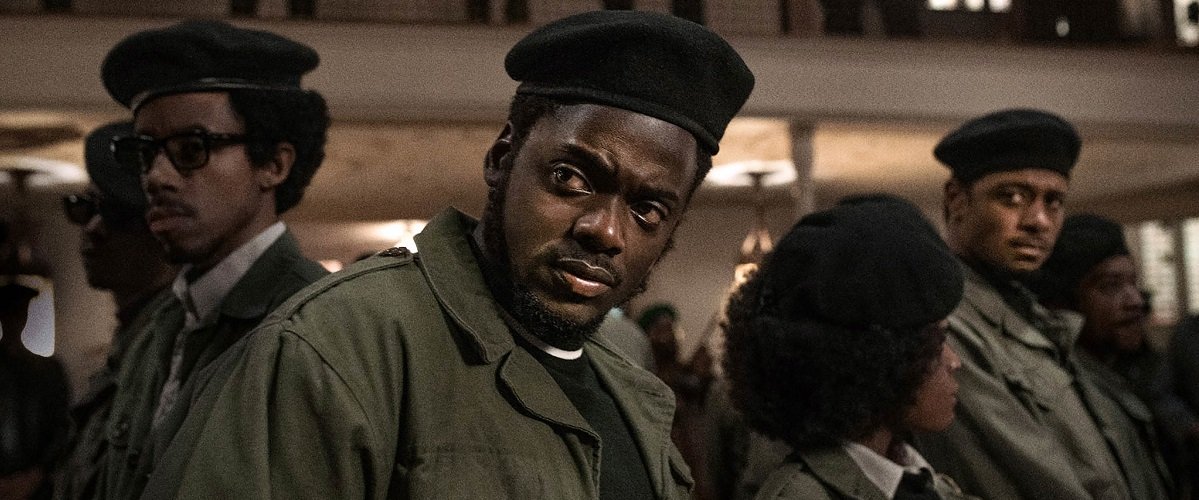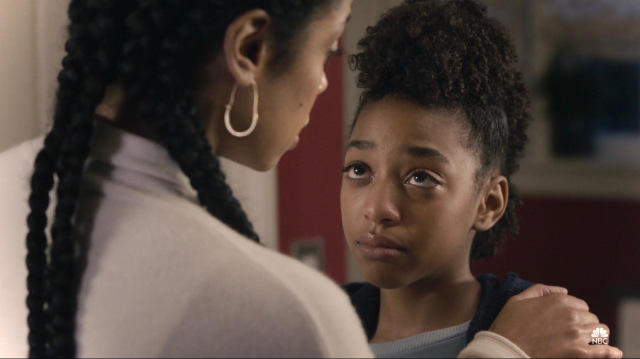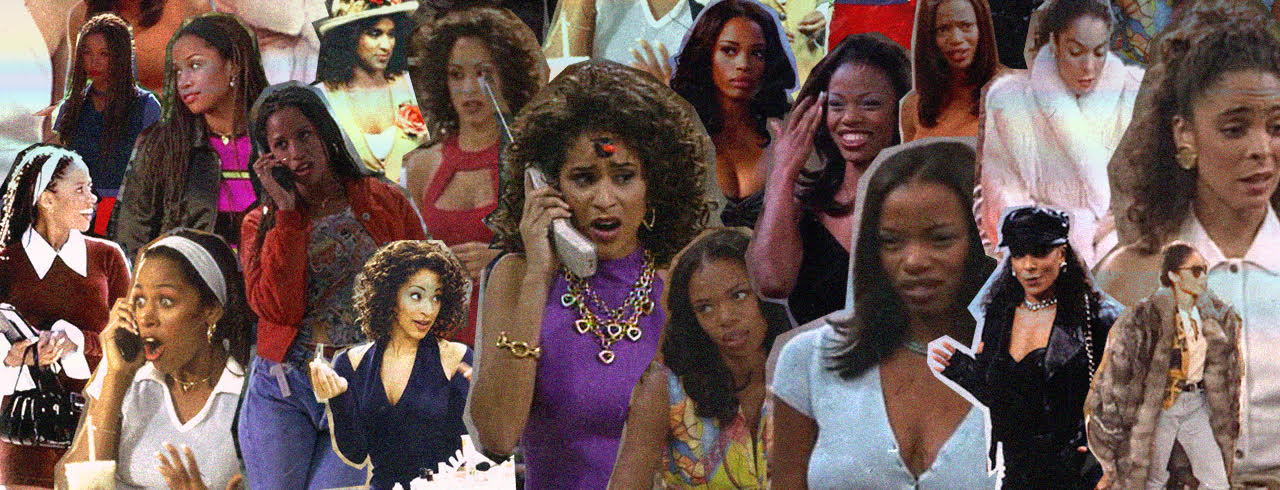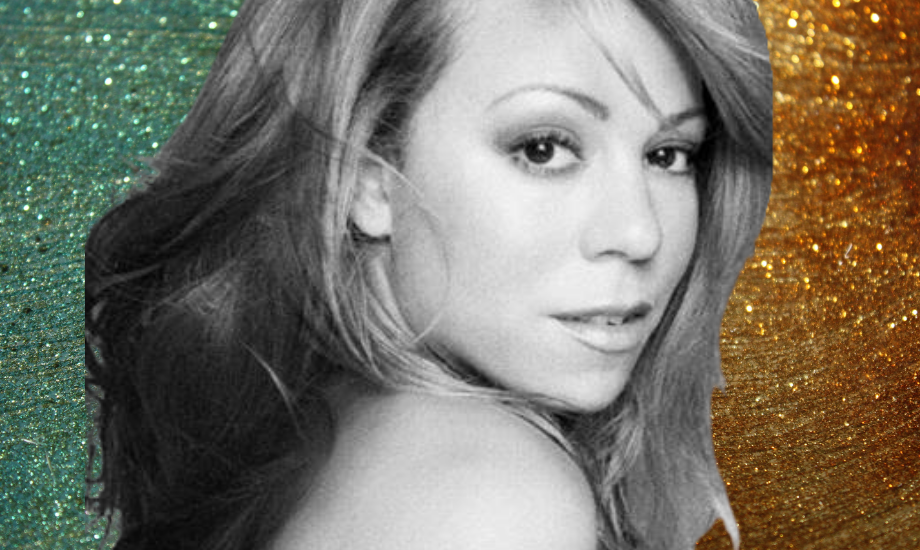
Collage via Channel 4 / YouTube
‘Popworld wouldn’t work today’: Miquita Oliver on the chaotic music show’s 20th birthday
The TV legend talks about her first gig, being a lone mixed-race woman in that space and which interviewees she’d like to shag.
Kemi Alemoru
22 Jan 2021
Cast your mind back to the Noughties. Exactly 20 years ago this week, on 20 January 2001, a show backed by music industry bigwig Simon Fuller (the rumoured “S” in S Club 7, who gave us the Spice Girls, Amy Winehouse and Pop Idol) brightened our Sunday morning telly. It embraced chaos, revelled in uncomfortable silences and made viewers feel like they were in on the risky jokes with so-awkward-they’re-cool hosts Simon Amstell and Miquita Oliver. They carried the show, with Simon pressing popstars’ buttons like an annoying little brother and Miquita acerbically quizzing celebs who seemed intimidated by the pair’s bullshit detectors.
The hill I am willing to die on is that the music industry lost a piece of its soul when Popworld shut up shop. It was Top of the Pops’ sarcastic teenage progeny and predated the late Noughties boom in screeching vloggers doing reaction videos to the latest pop visuals on YouTube – which hadn’t yet been born. It showed little regard for the rules of television, which often elevated celebrities to an untouchable god-like status. Instead, they used formats like Lemar from Afar, where the hosts interviewed Lemar from across a carpark with a megaphone, Simon Webbe’s ball bag, and scenes where a fresh-faced Amy Winehouse personally campaigned for a Brit Award in the streets of London (“Don’t vote for Dido! Dido will kill you!”). As music television goes, it’s hard to think of a show since which has reached the same level of nonchalance, coolness and anarchy, or one where intimidatingly young people host and conceptualise the content.
“They said telling Atomic Kitten they’re shit was too far, and we were like ‘if that’s too far, then what are we here for?’”
Were TV executives nervous about the havoc they were wreaking? “Well me and Simon [were making] Popworld, they [weren’t],” says Miquita. Speaking to me from her East London home after a day of filming, Miquita still looks fresh as a daisy, her raspy and slightly plummy voice dipping into the sardonic tone Popworld viewers came to know and love. “They said they wanted an edgy pop music show, but they didn’t really want that. They didn’t say ‘you can tell Atomic Kitten they’re shit.’ They said that was too far, and we were like ‘if that’s too far, then what are we here for?’”
She was just 15 when she was hired, but the show really found its feet once the enthusiastic hosts pushed their own vision. “It was a very small show, they just sort of left us to it. The minute we started saying what we wanted the ratings quadrupled.” In 2004, it pulled in around one million viewers each episode. Eventually a producer named Dan Swimer “who really got what [they] were trying to achieve” joined and co-created some of the show’s funniest formats. Together they would completely subvert what was expected of Sunday morning television, giving it the edgy feel you’d expect of a risky Saturday night slot. Simon was keen to bring an almost Monty Python-esque comedic slant which nobody would expect from a pop music show, and Miquita would mimic the interview style of Michael Parkinson on vapid conveyor belt pop acts.
Aping Popworld’s ‘Big Ones’ format where they asked stars a range of deep and nonsensical questions, I quiz Miquita on everything from what she does when no one is looking (“I dance, I have to shack out like four times a day”) to which of her Popworld interviewees she wanted to shag the most. The answer was Charlie from Busted, who she got to ride around on scooters with for a Christmas special (“I was living my dream, I was in love with him”). I also found out that she is most likely to shove actor Christoph Waltz’ head into a flushing toilet out of all her interviewees, as he was rude to her at the Green Hornet film junket (“He was acting like it was Macbeth, you’re playing a fucking insect”).
“Popworld was a real leveller. It was the first time that the guests weren’t something to be bowed down to”
The beauty of asking stupid questions is that you get really revealing reactions. How many times has a musician been asked about their writing process, or who their inspirations are? So many. How many times have they been asked whether they’ve licked a battery? By the look on Britney Spears’ face: never.
“Popworld was a real leveller,” explains Miquita. “It was the first time that the guests weren’t something to be bowed down to. We weren’t rude, we just told the truth and sometimes the truth is a bit more sticky – but it makes much better bloody telly!”
Viewers got to watch the two presenters grow as professionals but also as friends. It was reported that neither of them got on in the beginning which Miquita confirms is correct – “I could not understand him as a human being.” She had learned about the audition through a friend of her mum, musician and TV presenter Andi Oliver.
She continues: “We did the screen test and he’d already been cast. For context, I wasn’t out auditioning. I was at school studying for my GCSEs. Afterwards we were talking and I told him I was going to a party and he was like, ‘what do you mean, a party…?’ But he is from a sheltered part of Essex and I was not like that.”
“In the beginning, I could not understand Simon as a human being”
Eventually their bond grew to the point where they made a pact: if one of them quit, the other one also had to leave. “I didn’t want Popworld to end. But Simon was like ‘we’ve done brilliant work but it’s been five years’. I don’t think it would have ever worked with one of us and someone else. We didn’t want it to jump the shark and get shitty and stupid… although we did have a talking horse,” she laughs loudly. “That’s when we were like ‘I think we’re done.’” They were replaced by Alexa Chung and Alex Zane, but it ended shortly afterward due to the double blow of a dip in ratings and an unsuccessful and expensive print magazine launch.
Now Simon and Miquita are still close, and she reveals they had a long FaceTime about this interview the day before. “We laughed about how shit we looked back then,” she says. “We’ve both tapped into our power instead of straightening our hair. He was talking about how that phase of straight hair was a result of ‘some serious Jew loathing’”.
Despite it being something that made them self-conscious, the hypervisibility of a young gay Jewish boy, alongside an edgy black girl, is one of the reasons Popworld holds such a dear place in my heart – and the hearts of so many others who were growing up in Britain at the time. Miquita was a very early example of a quirky mixed-race Black woman to prominently feature on a major TV show. Luckily, she was working on a show that aired on the T4 slot, a segment that was hosted by presenter June Sarpong, but in the industry at large she didn’t see many other women like her in positions of power. “No one who looked like me was around. I think that affected me more than I knew,” she says.
“No one who looked like me was around. I think that affected me more than I knew”
“I didn’t feel my power at all in the space. So I started to make myself smaller. People who were around me seemed to elevate themselves to another place, but I could never feel like more than a lucky girl who got a lucky gig and messed it all up rather than a successful broadcaster.” The T4 slot was a star maker. Simon went on to rile up more celebrities on Nevermind the Buzzcocks, Alexa Chung forged a career in fashion, Nick Grimshaw is still one of the most recognisable presenters in the country and Jameela Jamil now acts in an Emmy-nominated show and literally invented feminism. “Everyone got slicker and neater,” Miquita remembers, “I had this weave that I detested – it made me feel dirtier or more ‘other’, but I couldn’t imagine being on TV without it.”
Miquita looks back on the show with fond memories even though she feels she lost a part of herself by becoming famous at such a young age (“who you are becomes really confusing to you because you haven’t really figured it out yet at 15 or 17”). She envies her “fearless little maniac self” who carved out an impressive career that changed the tone and trajectory of music television – particularly as after the show she had some well-documented personal struggles. “I was exhausted. When you can feel something about to fall apart sometimes you think ‘well everything is falling to shit so I’m just going to behave worse’. How big can we go? Let’s go bankrupt.” She did actually go bankrupt.
Once her Popworld days were over, she partied hard and started arriving late to her new T4 hosting days. She says she felt “grubbier”, although her version of grubby was still “ridiculously fancy” by most people’s standards. “A few of my friends and people I’d met through work all became big around the same time so we’d go to Nobu. We would have paparazzi snapping us falling out of clubs in Soho, I think one time I carried Lily [Allen] out of a restaurant in a bag. We were acting like total arseholes.”
She compares the entertainment industry of the noughties to now through the lens of her popstar cousin Mabel. “It’s just different. She’s a lot more careful and business-minded and young stars care more about what they’re putting out as their image. They have social media – I’d rather have dealt with paparazzi to be honest, it’s less intense.”
Therein lies the beauty of Popworld – it was a sweet spot before everyone started taking themselves so seriously. When journalists weren’t terrified of being reprimanded by PRs for challenging interviewees, and when celebrities relied more heavily on television and print press to be visible. “I don’t think that it would work today. It hadn’t been done like that before. But the atmosphere of the country is different now,” adds Miquita.
Now all we have left of a time where pop stars were deservedly roasted, rather than sycophantically serenaded by interviewers, are a few YouTube clips. Revisiting them reminds you of the unparalleled joy that comes from poking fun at the nature of celebrity. The Popworld archive is testament to the enduring power of snark which pop culture always needs a healthy dose of, to humble itself. RIP.









